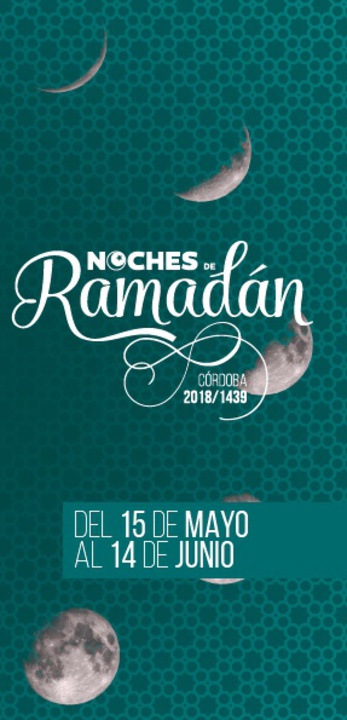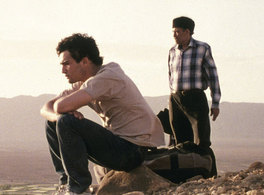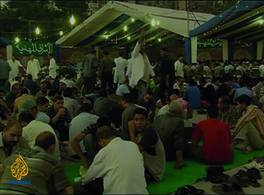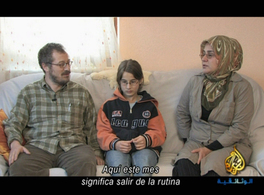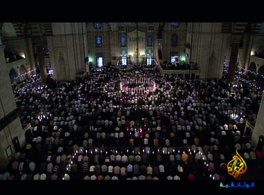Special programs
Index / Activities / Special programs / Nights of Ramadan in Cordoba 2018
Nights of Ramadan in Cordoba 2018
On the occasion of the celebrations marking the month of Ramadan, Casa
Árabe has organized a special series of events for the fifth year in a
row in Cordoba.
Ramadan is the most important month of the year for millions of Muslims around the world. It is time devoted to inner reflection, meeting with family and friends and sharing experiences. In our country, Muslims are one of the religious communities with the largest number of worshippers, many of whom are Spanish. Amongst them, over 10,000 are in Cordoba and more than 300,000 in Andalusia overall.
In this year of 2018, Ramadan begins on May 15 (with slight variations depending on the country where you are located), and Laylat al-Qadr or the Night of Destiny, will take place on the night of June 10 (yet to be determined), with the festival marking the end of Ramadan on June 15. The Nights of Ramadan is a festival that was created in 2006 in the neighborhood of Lavapiés (Madrid) in order to promote integration and cultural cooperation amongst the people co-existing in the same public space. Throughout the various editions held in Madrid and Cordoba, the Nights of Ramadan event has become a unique meeting point for increasing awareness about the Muslim world’s culture, so present in our shared history. Some are able to celebrate their most important festivity of the year, while others come to share and learn about the lives of their closest neighbors.
For the fifth year in a row, Casa Árabe, with the cooperation of the Municipal Government of Cordoba and the Halal Institute-Junta Islámica, have made a determined commitment to diversity and peaceful co-existence, and most especially to the role played by culture in increasing awareness and integration. Music, film, exhibitions, conferences, colloquiums, tours and theme walks... activities for youths and adults that reflect a rich plurality in art and thinking. From May 15 through June 15, the Nights of Ramadan will therefore become a time for coming closer together and getting a more in-depth awareness of the Muslim world’s culture, to become more familiar with them and acknowledge others and become mutually enriched. We invite you to discover the full schedule of activities and to wish all the Muslims you know a Happy Ramadan, just as we will be doing throughout this month of feasts and celebration: “Ramadan Mubarak.”
In this year of 2018, Ramadan begins on May 15 (with slight variations depending on the country where you are located), and Laylat al-Qadr or the Night of Destiny, will take place on the night of June 10 (yet to be determined), with the festival marking the end of Ramadan on June 15. The Nights of Ramadan is a festival that was created in 2006 in the neighborhood of Lavapiés (Madrid) in order to promote integration and cultural cooperation amongst the people co-existing in the same public space. Throughout the various editions held in Madrid and Cordoba, the Nights of Ramadan event has become a unique meeting point for increasing awareness about the Muslim world’s culture, so present in our shared history. Some are able to celebrate their most important festivity of the year, while others come to share and learn about the lives of their closest neighbors.
For the fifth year in a row, Casa Árabe, with the cooperation of the Municipal Government of Cordoba and the Halal Institute-Junta Islámica, have made a determined commitment to diversity and peaceful co-existence, and most especially to the role played by culture in increasing awareness and integration. Music, film, exhibitions, conferences, colloquiums, tours and theme walks... activities for youths and adults that reflect a rich plurality in art and thinking. From May 15 through June 15, the Nights of Ramadan will therefore become a time for coming closer together and getting a more in-depth awareness of the Muslim world’s culture, to become more familiar with them and acknowledge others and become mutually enriched. We invite you to discover the full schedule of activities and to wish all the Muslims you know a Happy Ramadan, just as we will be doing throughout this month of feasts and celebration: “Ramadan Mubarak.”
-
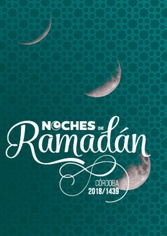
Islamic festivals and traditions
From May 15, 2018 until June 15, 2018Monday to Friday, from 9:00 a.m. to 2:00 p.m. Closed weekends.CóRDOBAIMTUR (c/ Rey Heredia, 22). Monday to Friday, from 9:00 a.m. to 2:00 p.m. Closed weekends. Free entrance.Cordoba’s Municipal Tourism Institute (IMTUR) is hosting this exhibition at its Cordoba headquarters. It will allow visitors to become more familiar with this religion’s most notable celebrations.Through educational panels, the exhibit provides information on the most important aspects of holidays and festivals in the Islamic religion, as well as the Islamic calendar, traditions and celebratory customs.
The exhibition can be seen throughout the entire month of Ramadan. Entry is free of charge.
Please see the exhibition catalogue.
-
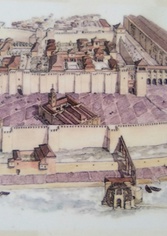
The survival of Al-Andalus Qurtuba in twenty-first century Cordoba
May 16, 20187:30 p.m.CóRDOBAVisitor Welcoming Center. Plaza del Triunfo, s/n 7:30 p.m. Free entry until the event’s capacity is reached.In Spanish.As part of the “Nights of Ramadan 2018,” Juan Francisco Murillo Redondo, head of the Archeology Unit at the Municipal Government of Cordoba, will be giving this conference.During the conference, there will be a review of the material marks left behind by the five long centuries of Qurtuba’s existence, as an Islamic city and the capital of Al-Andalus, in the Cordoba of the twenty-first century which we now inhabit. In some cases, this mark has always remained present, as with the Mosque-Cathedral, but in others it is neither very obvious nor has it been permanent, but instead has materialized as a result of archeological research.
Therefore, Juan Francisco will briefly focus on several aspects to be discussed further and in greater depth during the theme walks and guided tours which form part of the schedule of this edition of the “Nights of Ramadan.” First of all, he will discuss the trademarks of political and religious power in the medina of Cordoba, represented by two major dynastic buildings constructed by Cordoba’s Umayyad rulers: the Alcázar and Aljama Mosque. There we will highlight the importance of the Roman and Spanish Visigoth legacies as elements which articulate the urban landscape, over which the Islamic transformation would take place as of the year 711. The three theme walks of the Alcázares, Minarets and Mosques, and the Arab Baths will round off this first section.
Secondly, context will be given about the suburbs of Madinat Qurtuba, understood as a space outside the city walls where activities of all types took place: residential, productive, cultural and funerary, in outer boroughs and cemeteries structured on the basis of the religious and cultural identities of their inhabitants. The relationship between this complex, extensive suburban space and the medina in the stricter sense would diachronically mark historical change across time in Islamic Cordoba, with stages of urban expansion and contraction. The theme walk on the Suburbs of Madinat Qurtuba will allow us to get a more in-depth look at the reality of our city’s Islamic past, the material facets of which have remained hidden until revealed by recent archeological research.
Thirdly, we will analyze the way in which the Islamic city articulated its relations with the surrounding territory through a network of roads, part inherited and part created from scratch, both of which have also left their mark behind. And within this territory directly linked to Qurtuba and intended for meeting its most immediate needs, we will place close attention on the “almunias” as a model for productive settlement and a recreational/residential space characteristic of Umayyad Cordoba, also put in place with an eminently dynastic purpose, by ‘Abd al-Rahman I. The theme walk through the Almunia of al-Rummaniyya, and the walks known as the Camino de los Nogales and the Camino de las Almunias will provide those participating with the chance to get a glimpse at the way in which this peri-urban space was used in Cordoba.
To end these tours, the head of the Archeology Unit at the Municipal Government of Cordoba will be focusing on a very specific moment within the historical timeline of Islamic Cordoba, the second half of the tenth century, when the economic, political and cultural development promoted by the Caliphate led to radical change in the historical process and urbanism in Madinat Qurtuba, which had now become a city of colossal dimensions for its era and would co-exist side by side with two other cities, though these could never outshine it: Madinat al-Zahra, as of the year 936, and Madinat al-Zahira starting in 979. The co-existence of a large metropolis with a lengthy and prestigious historical past (Madinat Qurtuba) and the two more ephemeral Palatine cities, which existed in response to opposed ideological and political discourses (Madinat al-Zahra and Madinat al-Zahira) would lead to a large conurbation, a megalopolis, which was unprecedented in the surrounding Mediterranean world, for which we can only find models in the Abbasid capitals of Baghdad and Samarra. The walks and activities planned at Madinat al-Zahra will allow us to continue learning more about this great treasure forming part of Mankind’s Islamic legacy. We can only hope that, in some future time, our children or grandchildren will also be able to visit Madinat al-Zahira, the “shining city,” which will undoubtedly cast new light onto Cordoba’s Islamic past.
Juan F. Murillo Redondo has been the director of the Archeology Office at the Department of Urbanism of the Municipal Government of Cordoba since 1993. Forming part of the Archeology Department at the University of Cordoba since 1988, he has collaborated as an educator in several doctorate and graduate programs, and as a researcher on many different projects financed by public institutions. He has contributed to introducing the stratigraphic system of excavation in Cordoba and the implementation of the al-Mulk registration system. A member of the PAI-HUM-236 Research Group (Archeology as a documentary basis for historical interpretation) at the University of Cordoba, he has carried out several research projects on the transition between the late ancient city and the early medieval city, and analyses of the strategies for exploitation of the peri-urban environment of Cordoba. He is also the author of over a dozen monographic works and articles in specialized journals from Spain and abroad.
For further details, please see the website of Cordoba’s Municipal Tourism Institute (IMTUR).
-

Citizenship at the peripheries of the Islamic world
May 17, 20187:30 p.m.CóRDOBACasa Árabe Auditorium (at Calle Samuel de los Santos Gener, 9). 7:30 p.m. Free entry until the event’s capacity is reached.In Spanish.Within the framework of the Nights of Ramadan, the Junta Islámica and Halal Institute, with the cooperation of Casa Árabe, are presenting a series of conferences titled “Citizenship and Islam.” This is the first of three round table discussions that will revolve around this topic.“Islamic peripheries” is the name given to the territories outside of the Middle East and North Africa region (MENA), where the majority of Muslims in the world actually live. Normally they are not associated with Islam despite the fact that some of these countries, like Indonesia and Nigeria, are those which have the largest Muslim populations of all worldwide. Others like Senegal and Malaysia are models for peaceful co-existence between different Islamic and non-Islamic cultures.
This initial conference will explore the crossroads between Islam at the peripheries and citizenship in these territories, placing a special emphasis on Africa and Southeast Asia as contexts. The goal is to break stereotypes not only through theory but also through praxis.
The event will include speeches by Shaykh ‘Abdallah al-Mishry, a member of Mauritania’s Association of Ulemas, and Antonio de Diego, who is responsible for the Islamic Documentation and Publications Center (CDPI) of Spain Junta Islámica. Presented by: Isabel Romero, president of the Junta Islámica.
Conference information sheet
Shaykh ’Abdallah al-Mishry was born in Mauritania in 1954 and is a shaykh of the Tijaniyya tariqa. Educated in the Islamic Sciences in Mauritania and Senegal, he studied Law and Economics at Cheikh Anta Diop University, as well as being a member of Mauritania’s Association of Ulemas and having participated in more than one hundred conferences and congresses. Since 1978, he has been the guiding force behind the educational village Ma’ata Maulana. His project works with traditional Islamic teaching for a contemporary world.
Antonio de Diego González is responsible for the Islamic Documentation and Publications Center (CDPI) of Spain’s Junta Islámica. Since 2016, he has been a PIF researcher (FPU pre-doctoral program of the Spanish government) at the University of Seville. With a PhD in Philosophy, he has completed field work in Islamic West Africa (Mauritania, Senegal) and the Caribbean. His lines of research focus on the philosophy of religion, the contemporary African intellectual history of Islam and the developments of contemporary sharia in the halal sector.
-
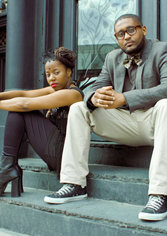
Concert by Native Sun
May 18, 20189:30 p.m.CóRDOBAAvda. Fray Albino (by the Torre de la Calahorra). 9:30 p.m. Free entrance.Nights of Ramadan 2018. In the unmatchable setting of the Torre de la Calahorra, the Junta Islámica-Halal Institute, Casa Árabe and Cordoba’s Municipal Tourism Institute (IMTUR) invite you to this show by Native Sun.With lyrics and music based on fusions from diverse cultures and an African soul, this young group is bringing a fresh act with addictive highlights to Cordoba, with an edifying message wrapped in a hip exterior, in a constant search for peace, equality and justice through music.It is a perfect show filled with light and positive energy to create an unforgettable musical evening during the “Nights of Ramadan.”Native Sun is a duo from London made up of rapper Mohammed Yahya (Mozambique) and Sarina Leah, a singer and composer from London with Caribbean roots. Since they came together in 2010, Native Sun has created fusions of hip hopand African rhythms with the goal of promoting a positive message of universal peace, equality, social justice and environmental change.
Throughout these years, the two performers have received great acclaim after a wide range of collaborative undertakings, recordings and international tours in Europe, Africa and the United States. They have also taken part in numerous recordings for television programs on channels like the BBC and ITV.
Further information
Concert information sheet
-
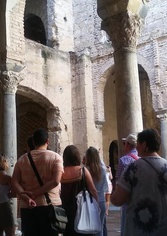
Guided tours of Al-Andalus Qurtuba
From May 18, 2018 until May 25, 20189:30 a.m.CóRDOBAMeeting point: Visitors Welcoming Center next to the Puerta del Puente 9:30 a.m. Free registration until the event’s capacity is reached (al-andalus@cordoba.es).In Spanish.Within the framework of Nights of Ramadan 2018, the Municipal Government of Cordoba and the IMTUR (Municipal Tourism Institute of Cordoba) have organized these five guided tours of Al-Andalus Cordoba, given by professionals guides. They will take place from May 21 to 25.The planned schedule is as follows: Departure from the Visitors Welcoming Center next to the Puerta del Puente; Almanzor Lavatories at the Hotel Conquistador; Patio de los Naranjos; Mosque of Santa Clara at Calle Rey Heredia, 22; Casa Mudéjar, the headquarters of Casa Árabe; the House Museum of the Umayyad Guadamecí; Calleja de la Hoguera; Municipal Souk; Museum of Alchemy and the Casa Andalusí.
-
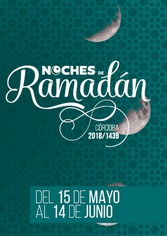
Astrolabes in Al-Andalus: Science and art, tradition and innovation
May 29, 20187:30 p.m.CóRDOBACasa Árabe Auditorium (at Calle Samuel de los Santos Gener, 9). 7:30 p.m. Free entry until the event’s capacity is reached.In Spanish.Within the framework of the Nights of Ramadan 2018, Casa Árabe will be hosting this conference, organized in conjunction with the Junta Islámica-Halal Institute, at its headquarters in Cordoba.The conference will be given by Azucena Hernández, a professor at the Universidad Complutense de Madrid, and will be introduced by Antonio de Diego.
The production of astrolabes in Al-Andalus, from the tenth century to the fall of Granada in 1492, held an important place in both the history of scientific instruments and in medieval artistic production in metal. The quality of their craftsmanship and the decorative work on the more than thirty astrolabes from Al-Andalus which have been handed down to us today make clear how useful those instruments were to the scientific community and to all of society in general, as well as their symbolic nature as an image of the universe and an evocation of scholarship linked to power. There is evidence in the structure of the astrolabes from Al-Andalus themselves of the role which they played in Islamic worship, as well.
The astrolabes of of Al-Andalus, illustrious witnesses to the synergy between science and art, while always combining tradition and innovation, demonstrate the balance between mathematics and astronomic precision and the decorative achievements that were reached at the workshops and centers of knowledge in Al-Andalus. Important astrolabe manufacturers like Muḥammad ibn al-Ṣaffār in Cordoba, Ibrāhīm ibn Sa’īd al-Sahlī in Toledo, Muḥammad ibn Fattūh al-Jamā’irī in Seville and Aḥmad ibn Ḥusayn ibn Bāṣo in Granada contributed to spreading knowledge in astronomy and mathematics to both the Christian Spanish kingdoms and to the rest of medieval Europe, thereby showing the scientific leadership held by Al-Andalus.
Azucena Hernández Pérez
With a PhD in Art History from the Universidad Complutense de Madrid (UCM), a bachelor’s degree in Physical Sciences and a Master’s degree in Advanced Studies in Spanish Art from the same university, Ms. Hernández currently collaborates as a researcher at the Department of Medieval Art History at the UCM and is a member of the national research, development and innovation project “Al-Andalus, the Spanish Kingdoms and Egypt: Art, power and knowledge in the medieval Mediterranean.” Her research revolves around studying the two facets of medieval astrolabes, scientific and artistic, including mainly those of Al-Andalus and the Christian Spanish kingdoms, and the way they were interwoven into the material culture of their time, contextualizing them with the production of astrolabes in Islam and medieval Europe.
-

Challenges for citizenship and Islam in Spain
May 31, 20187:30 p.m.CóRDOBACasa Árabe Auditorium (at Calle Samuel de los Santos Gener, 9). 7:30 p.m. Free entry until the event’s capacity is reached.In Spanish.Second conference in the series “Islam and Citizenship,” organized by the Junta Islámica-Halal Institute with the cooperation of Casa Árabe, as part of the Nights of Ramadan 2018.It will include the participation of Jaime Rossell, Sub-director General of Relations with Religious Confessions of the Spanish Ministry of Justice; Nessrin El-Hachlaf Bensaíd, a lawyer and journalist who specializes in diversity and migration; Bárbara Ruiz-Bejarano, director of Institutional Relations at the Halal Institute, and Farid Bentría, an intercultural coordinator.
Today, Muslims make up 4% of Spain’s population, according to the demographic data in the report by the Observatorio Andalusí produced by UCIDE and the data in the annual report on the status of religious freedom in Spain, published by the Ministry of Justice, thereby forming the largest religious minority in our country.
In Spain, Muslims face a wide range of challenges and hurdles in achieving full citizenship. Through the intervening speakers, this round table discussion will provide different viewpoints on this interesting topic involving Muslims and non-Muslims alike, from the perspectives of the public administration, civil society and legal practice.
ABOUT THE SPEAKERS
Jaime Rossell Granados is the Sub-director General of Relations with Religious Confessions at the Spanish Ministry of Justice. With a PhD in Law, for which he earned a Special Award at the Universidad Complutense de Madrid, he has been a tenured professor in Ecclesiastical Law of the State since 1999 and the chair of the professorship in Ecclesiastical Law of the State since 2012. He was the Dean of the School of Law at the University of Extremadura from 2007 to 2015. He has also been a professor at the Schools of Law of the Universidad Complutense and the German University of Trier, and has taught numerous seminars at different European universities.
Bárbara Ruiz-Bejarano is the Institutional Relations Director at the Halal Institute. With a PhD in Arab and Islamic Studies, she is a member of the UNESCO-UA Chair in “Islam, Culture and Society” and specializes in the History of Spanish Islam, Muslim minorities in non-Islamic countries and Islamophobia. She was also the director of the CCIV. In recent years, she has taken part in numerous seminars and events on Halal tourism, including COMCEC (Ankara), the World Halal Summit (Istanbul), the Korea Halal Summit (Seoul) and the Thailand Halal Assembly (Bangkok).
Nessrin El Hachlaf Bensaíd is a lawyer and journalist who specializes in diversity and migration. With a bachelor’s degree in Law and Journalism from the Universidad Carlos III of Madrid, she specializes in Law on Foreign Nationals and Criminal Law and is currently a public offender in the Criminal Procedure section and a lawyer for the Legal Orientation Service of the Autonomous Region of Madrid in the sections of Law on Foreign Nationals and Victims of Violent Crimes. She is also a legal advisor for the KIF KIF Association of Lesbian, Gay, Transsexual and Bisexual Migrants and Refugees of Madrid. She has been an analyst of doctrine at Spain’s Constitutional Court.
Farid Bentría Ramos is a coordinator of Intercultural Affairs and Citizenship in different projects and for different foundations, as well as an advisor on 2.0 topics, gender, interculturalism, new citizenship, etc., for both public and private institutions, and on social and political topics, always with great commitment and a desire to contribute the most constructive focus possible.
-
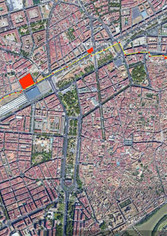
Theme Tour: The Route of Cordoba’s “Arrabales”
June 04, 20189:00 a.m.CóRDOBAMeeting point: Arrabal de los Alfareros (at Calle Héroes de Chernobyl, at the corner of Avda. de las Ollerías). 9:00 a.m. Free registration until the event’s capacity is reached. al-andalus@cordoba.esIn Spanish.Within the framework of Nights of Ramadan 2018, the Municipal Government of Cordoba and IMTUR - Cordoba's Municipal Tourism Institute have organized this theme walk through the Islamic remains located in the borough at the city's outskirts.At this event, they will be speaking to us about the Islamic heritage sites existing at the Puerta del Colodro, about the “almunia” within the Renfe Plan across from the Hotel Córdoba Center, about the mihrab and the qibla at the Bus Station, the Islamic remains in the Arrabal de Cercadilla, the caliph's pool at Avenida de los Aguijones next to the Arroyo del Moro (Moor's Creek) and, last of all, we will visit the excavation of Partial Plan O-7, where some impressive Islamic remains have appeared (mosque, baths, homes, streets).
The tour will be guided by archeologist Manuel Cobo Aguilera, of Empresa de Arqueología, Gestión Turística y Cultural SALSUM, S.S.L.
Organize: Municipal Government of Cordoba, IMTUR
-
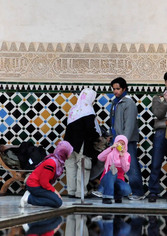 Foto: Musulmanas asiáticas en la Alhambra (Sahra Hazbel).
Foto: Musulmanas asiáticas en la Alhambra (Sahra Hazbel).“Halal” tourism: The opportunity of the millennium
June 04, 20187:30 p.m.CóRDOBACasa Árabe Auditorium (at Calle Samuel de los Santos Gener, 9). 7:30 p.m. Free entry until the event’s capacity is reached.In Spanish.This round table discussion, which forms part of the Nights of Ramadan 2018, will explore the “Muslim-Friendly” concept designed to provide services which Muslims will identify as more approachable or friendly within a cultural environment that is different from their own.It will include interventions by Bárbara Ruiz-Bejarano, a doctor of Arab and Islamic Studies, and Tomás Guerrero, director of the Halal Institute office in Madrid. Moderated by Rafael Pérez de la Concha
Halal is a global concept which refers to the full ensemble of practices and behaviors which are permitted, licit and healthy in accordance with the shari'a or Islamic law. At present, all industries related with the concept of halal are growing, so there is special demand for personnel qualified to ensure the quality of the products and services being sought out.
Spain, being the second most important tourist destination in Europe, attracts many other tourists whose cultural expectations revolve around a combination of its immense wealth in heritage and its extensive immaterial culture. Touring Andalusia from the perspective of Al-Andalus lets tourists live an experience beyond just the contemporary dimension, allowing them to understand one of the most splendid civilizations on the Iberian Peninsula. And, if we also add the value of it being “Muslim-Friendly,” this becomes an incentive of great interest to Muslim tourists.
The round table discussion will explore the “Muslim-Friendly” concept designed to provide services which Muslims will identify as more approachable for friendly within a cultural environment different from their own. Small details like pointing out the direction towards Mecca for prayer, or providing foods that are halal, can make quite a difference to customers.
Bárbara Ruiz-Bejarano has a PhD in Arab and Islamic Studies She is a member of the UNESCO-UA Chair in “Islam, Culture and Society” and specializes in the History of Spanish Islam, Muslim minorities in non-Islamic countries and Islamophobia. In recent years, she has taken part in numerous seminars and events on Halal tourism, including COMCEC (Ankara), the World Halal Summit (Istanbul), the Korea Halal Summit (Seoul) and the Thailand Halal Assembly (Bangkok).
Tomás Guerrero is the director of the Halal Institute office in Madrid, an associate researcher at the IE Business School-Sovereign Wealth Lab, a WIEF youth leader, the managing director of Halal International Tourism, a Senior Associate for Spain & Latin America at DinarStandard, an associate researcher at Tufts University - The Fletcher Network for Sovereign Wealth and Global Capital and a PhD student at the Universidad Carlos III of Madrid. His main lines of research are the Halal industry, sovereign funds and border markets. He has a university degree in Law and in Economics from the Universidad Carlos III of Madrid and a Master's degree in Development and Economic Growth from the same university.
Organize: Halal Institute - Halal International Tourism
-
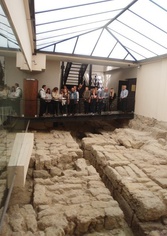
Theme Tour: Route of the Baths
June 05, 201810:00 a.m.CóRDOBAMeeting point: Visitors Welcoming Center (CRV) next to the Puerta del Puente. 10:00 a.m. Free tour with prior registration until capacity is reached, by writing to: al-andalus@cordoba.esIn Spanish.New tour as part of the Nights of Ramadan festival, to be guided by Belén Vázquez Navajas, with a PhD in Archeology.The Municipal Government of Cordoba and IMTUR - Cordoba's Municipal Tourism Institute have organized this new theme tour, in which we will be visiting the Lavatorios de Almanzor at the Hotel Conquistador, the baths of Santa María on Calle Velázquez Bosco, the baths at the Caliph's Alcázar, ending with the baths of Doña Leonor, in the Alcázar of the Christian Kings.
Organize: Municipal Government of Cordoba, IMTUR
-
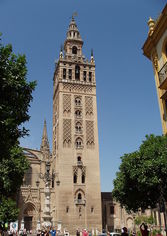 CC BY-SA 3.0 Giralda de Sevilla
CC BY-SA 3.0 Giralda de SevillaReligious reform by the Almohads and its reflection in architecture
June 05, 20187:30 p.m.CóRDOBACasa Árabe Auditorium (at Calle Samuel de los Santos Gener, 9). 7:30 p.m. Free entry until the event’s capacity is reached.In Spanish.As part of the Nights of Ramadan 2018, Casa Árabe is hosting this conference at its headquarters, to be given by Belén Cuenca Abellán, of the UPO.To be analyzed at the conference is the formation of the religious doctrine that Ibn Tumart developed after traveling to the East and bringing it back to his native land in Al-Maghreb. Ibn Tumart returned convinced that the Islam practiced in Al-Maghreb had undergone a process of degradation. His mission was to recover the original doctrine of Islam. In his preachings, he passed on all of the knowledge he had learned in the East and took a position against the Almoravids. The conference will analyze that journey, the lines of doctrine which he acquired as a disciple of al-Gazzali and the compilation of Almohad doctrine through the assertion of the Tawhid.
The formation of the Almohad caliphate will be discussed more extensively, as well as the building of the mosques of Tinmal and Marrakesh after Al-Maghreb's conquest, analyzing the peculiar religious architecture created by the caliphs, very much related with their doctrine and somewhat different from what had been seen before. Special mention will be made of the use of the “mocárabe” dome.
Last of all, we will get an overview of the arrival of the Almohads in Al-Andalus and the construction of the Aljama Mosque in Seville, with the configuration of that city as the caliphate's capital. Also mentioned will be the religious propaganda displayed in civil buildings and coins.
Belén Cuenca Abellán is an art historian with a Master's degree in the Religious Sciences from the Universidad Complutense de Madrid. Her professional life has revolved around researching religious architectural remains from theeighth century, the results of which will be found in her upcoming doctoral thesis. She has worked for public institutions, and as a Medieval History tutor at the Universidad Complutense de Madrid. She is currently teaching a course on the History of Islam at Club Iberia Madrid. She is a professional guide at Viajes Iverem and actively participates in the events organized by the Association of Young Researchers in the Religious Sciences. She has also worked with the Intercultural Spanish-Arab Circle and the CISEG (Intelligence and Global Security Community) group, as the manager of the Delegation from the Valencian Autonomous Region and Eastern Spain.
Organize: Junta Islámica-Halal Institute
-
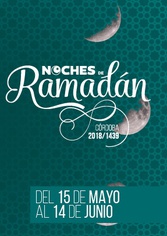
Islam in Europe: The United Kingdom and France as models
June 07, 20187:30 p.m.CóRDOBACasa Árabe Auditorium (at Calle Samuel de los Santos Gener, 9). 7:30 p.m. Free entry until the event’s capacity is reached.In Spanish.As part of the series titled “Islam and Citizenship” and the Nights of Ramadan 2018 festival, the Junta Islámica-Halal Institute have organized this conference.It will be given by Humera Khan and Shaykh Khaled Bentounes, who will discuss the models in the United Kingdom and France, respectively, their characteristics and the possibility of extrapolating them to our country.
-
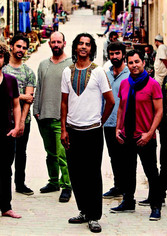 Fotografía de Polina Schapova, http://polka.photos/
Fotografía de Polina Schapova, http://polka.photos/Concert by Gabacho Maroc
June 08, 20188:00 p.m.CóRDOBAEscenario Nilo (next to the Molino de San Antonio) 8:00 p.m. Free entry until the event’s capacity is reached.As part of the festivals Nights of Ramadan and Riomundi, this group of French, Moroccan and Algerian musicians will be offering us Moroccan music and jazz in one single sound, with African elegance and rhythms acting as the common denominator that ties it all together.It is a dazzling group that uses traditional Moroccan instruments, percussion from Africa and the Maghreb region, vocals, brass instruments, the n'goni, keyboards, bass and drums. On the stage will be seven French, Moroccan and Algerian musicians, directed by the vocals and guembri of Hamid Moumen. Their compositions, inspired by the Gnawa heritage, African music, jazz, flamenco and Berber tradition, will transcend the styles and frontiers of the stage at the Escenario Nilo.
Performers:
Vincent Thomas: drums
Aziz Fayet: vocals, percussion, Arabic oud
Pierre Cherbero: keyboard
Mathieu Lucas: bass
Fred Faure: n'goni, percussion, vocals
Hamid Moumen: vocals, guembri, percussion
Illyes Ferfera: alto sax, vocals
The concert forms part of the Nights of Ramadan festival and the “RIOMUNDI International Festival of Experiences,” in which music, gourmet cuisine and handicrafts from the major cities located along the shores of the most important rivers of the world will play the starring role.
Organized by the Municipal Government of Cordoba and IMTUR, the common thread shared by all will be the Guadalquivir River (as the host), as well as the Thames, the Danube, the Hudson and the Nile. The last of these, the Nile, will be hosting the performance by Gabacho Maroc, a band that will be playing at more than 40 festivals this year, in Spain, France, Italy, Morocco, India and Chile, after being nominated for the African Music Awards.
Concert information sheet -
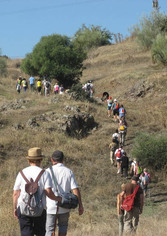
Hiking tour: “The Walnut Tree Trail to Madinat al-Zahra”
June 09, 20188:00 a.m. We will return to the starting point by bus at about 1:30 p.m.CóRDOBAMeeting point: Hipercor (next to bus stop). 8:00 a.m. We will return to the starting point by bus at about 1:30 p.m. Free tour with prior registration until capacity is reached, by writing to: al-andalus@cordoba.esIn Spanish.Within the framework of the Nights of Ramadan 2018, we are offering this medium-difficulty hiking tour, with a distance of approximately 5 kilometers. You can sign up now.This walk will go through Turruñuelos, the Puente de los Nogales bridge, the quarries of the Cortijo de la Torrecilla, and cross the Arroyo de la Gitana creek and Vallehermoso creek, ending at the archeological site of Madinat al-Zahra.
The explanations will be given by a biologist and official tourist guide from the active tourism company CÓRDOBA VIVA.
Organize: Municipal Government of Cordoba and IMTUR - Cordoba's Municipal Tourism Institute
-
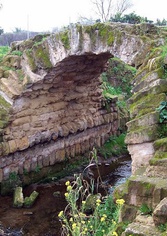
Cycling tourism route: “The trail from the ‘almunias’ to Madinat al-Zahra”
June 10, 20188:00 a.m. We will return to Cordoba using the bike path at approximately 1:30 p.m.CóRDOBAMeeting point: Visitor Welcoming Center (CRV). 8:00 a.m. We will return to Cordoba using the bike path at approximately 1:30 p.m. Free tour with prior registration until capacity is reached, by writing to: al-andalus@cordoba.esIn Spanish.On this occasion, we will be holding a tour on bicycle with a distance of 15 kilometers, to be coordinated by Zumaya. As part of the Nights of Ramadan 2018.This walk will pass through the Almunia de Al-Naura, Puente de Ibn Firnás, the caliph's bridge of Cañito de María Ruiz, the Old Trail of Almodóvar and the Cañada Real Soriana, ending with a stop at the Visitors' Center and Museum of Madinat Al-Zahra.
Organize: Municipal Government of Cordoba and IMTUR - Cordoba's Municipal Tourism Institute
-
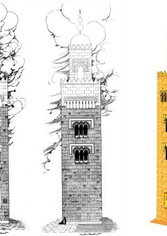
Route of the minarets and mosques
June 11, 201810:00 a.m.CóRDOBAMeeting point: Visitors Welcoming Center (CRV) next to the Puerta del Puente. 10:00 a.m. Free tour with prior registration until capacity is reached, by writing to: al-andalus@cordoba.esIn Spanish.Professor Alberto León, of the University of Cordoba, is guiding this tour organized as part of the Nights of Ramadan 2018 festival, put on by the Municipal Government of Cordoba and IMTUR - Cordoba's Municipal Tourism Institute.During the tour, he will talk to us about the minarets of Hisham I, Abd al-Rahman III, San Juan, San Lorenzo and Santiago, ending with a visit to the Mosque of Santa Clara and its minaret.
-

Cooking class for children
June 12, 20186:00 p.m.CóRDOBACasa Árabe headquarters (at Calle Samuel de los Santos Gener, 9). 6:00 p.m. You must register in advance to attend.Advanced registration required, at: info@institutohalal.com
In Spanish.Within the framework of the Nights of Ramadan 2018, the Halal Institute has organized this class with the goal of increasing awareness among kids about the concept of Halal.Moreover, it is intended to contribute to improving peaceful co-existence and respect for religious diversity. Hilene Galán, who will be giving the workshop, is a member of the management team at the Halal Institute, with a bachelor’s degree in Tourism and a love for creative gourmet cuisine. Among children and adults alike, she uses the concept of halal as a positive, healthy value that goes beyond just religious practices.
-
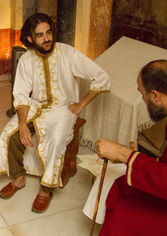
Theatrical performance of the “Confidences of Ibn Hazm”
June 12, 20188:00 p.m.CóRDOBACasa Árabe headquarters (at Calle Samuel de los Santos Gener, 9). 8:00 p.m. Free entry until the event’s capacity is reached.In Spanish.Within the framework of the Nights of Ramadan Festival of 2018, Casa Árabe has organized this theatrical performance which recreates the secret meetings held by the caliph Al Hakam II to ensure who his successor would be.“The chronicler Ibn Hazm tells us that, around the year of 975, the caliph Al Hakam II, knowing his death was near, gave the order to his faithful Jafar to ensure that his young son Hisham II would take over the throne, by formally naming him his heir. This was one of the most complex moments in his reign, because, being as sick as he was, and with a son who was barely four years old as the sole seeker of the throne, he was aware of the danger lurking for his dynasty.
This scene, recorded in the historical sources, has served as inspiration for putting on a special, secret meeting at the Casa Mudéjar, the current headquarters of Casa Árabe. After leaving the Palatine city of Madinat al-Zhara and taking up residence in the Alcázar for health reasons, the private realm of the household was the perfect place to meet informally with close individuals and others of great trust while avoiding onlookers and indiscreet eavesdroppers. On this occasion, we will be recreating the “secret” meeting held by Al Hakam II, his loyal vizier Jafar al-Mushafi and the elderly counsellor and best doctor of the court, Hasday Ibn Shaprut, a meeting which undoubtedly determined the future of the caliphate.”
Performance information sheet
SEXTOMARIO
This group was created because of a calling to teach history in a pleasant and entertaining way, without giving up the basic contents that form part of our values and culture, through a broad catalogue of educational workshops and games.
With this focus, the workshops strengthen skills such as paying attention, memory, psychomotor skills and coordination, while the youths learn about a wide range of aspects from our past and, in turn, reflect about our present.
SextoMario is made up of professionals with advanced degrees in Art History, History and Archeology, possessing excellent resumes with strong backgrounds in the history and archeology of Cordoba. Moreover, they have a great deal of experience in the field of teaching, which allows them to offer those who take part in their workshops with extensive, diversified information on the history and archeology of our past, always in accordance with the requirements of the topic at hand.
The extensive experience they have acquired includes several programs of an educational nature carried out in 2012, 2013 and 2014 with the CEP of Cordoba, having given various workshops with primary school children and archeological tours with secondary school students. Included amongst these programs were specific events for pre-school children and special education students, for whom the contents and structure of the workshops were adapted.
-
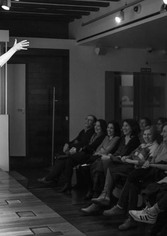 Fotografía de Conxi Avilés.
Fotografía de Conxi Avilés.Oral storytelling: “The Magic of The Arabian Nights”
June 14, 20187:30 p.m.CóRDOBACasa Árabe Auditorium (at Calle Samuel de los Santos Gener, 9). 7:30 p.m. Free entry until the event’s capacity is reached.In Spanish.As part of the Nights of Ramadan, Casa Árabe is offering this evening of oral storytelling for adults, given by Héctor Urién.The magic in The Arabian Nights is both dispersed and well outlined all at once. The magical tales intermix genies, North Africans and girls who have learned crafty arts from a certain lady, sometimes providing salvation, but other times evil. Perhaps this is one of the features of The Arabian Nights which is most magnetic. It is the magic that opens up Ali Baba’s cave, and the magic of the genie Aladdin that builds palaces, and that of the Jew’s daughter who restores the hero Mercury Ali to his human form. These may not be the exact tales which are told on each occasion, but the magic will surely surround us on this Night of Ramadan.
Performance information sheet

